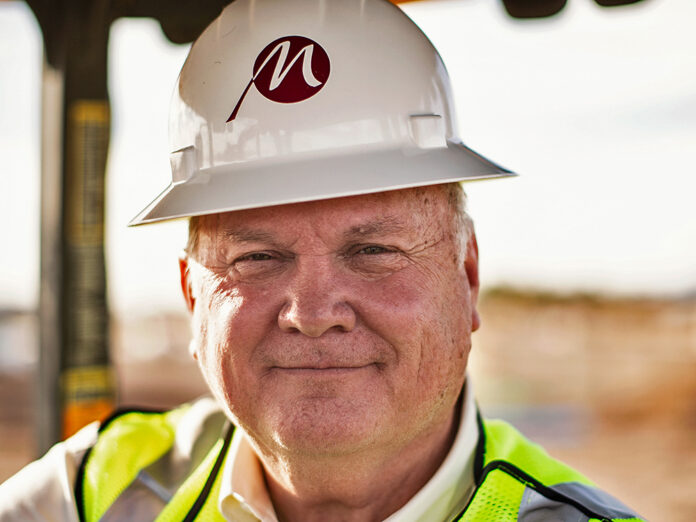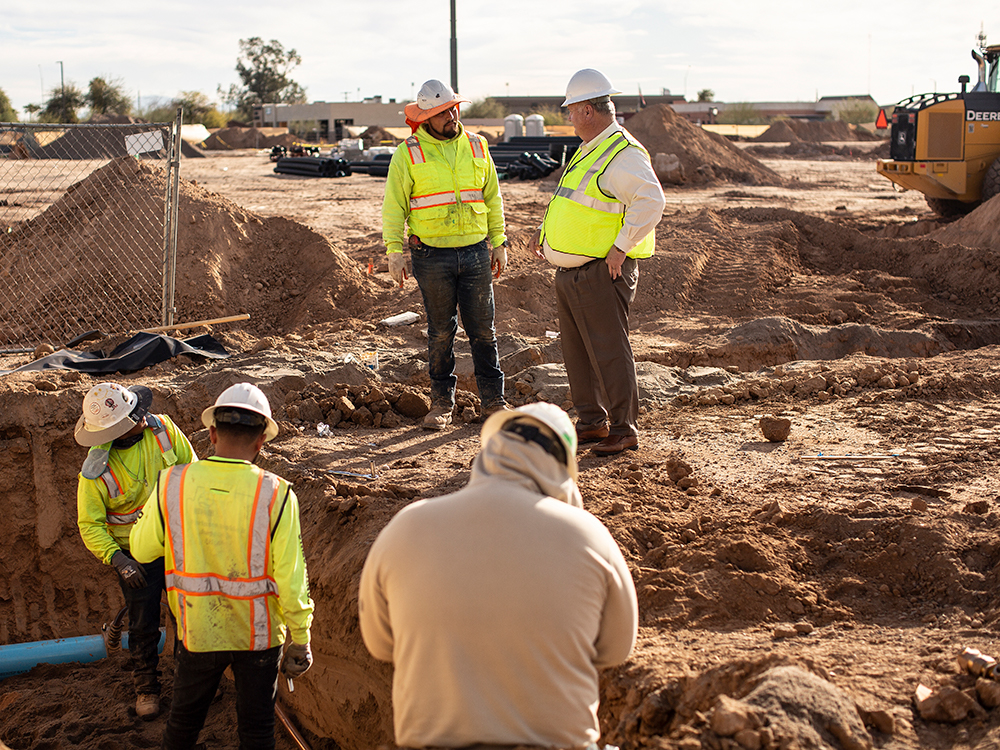
If there is such a thing as a practical visionary who can survive in government, Rick Horst may be that “unicorn.”
On his arrival as city manager in 2018, he set about to build a city — without creating debt.
That economic development philosophy was honed over a 30-year career in public administration. And it led him to this city in the desert with plenty of open land to
execute his vision.
Horst is happy to be in Maricopa, primarily because he came for all the right reasons.
“I came because I wanted to have fun, wanted to be challenged and I wanted to have the opportunity to share my expertise with a city council that I feel continues to be progressive and forward-thinking,” he said. “So, rather than being a city manager in a status quo city where I figure out how to handle the homeless every day, I wanted to build a city.”
Horst’s road to Maricopa went through Florida, Utah and California. Like most city managers, he’s had to move around the country, with his wife Cynthia, working his way up the ladder from public works to economic development to city management.
“I have always felt that it’s very important how you draw attention to your city, and build your city, and create opportunities,” he said. “I feel my primary job is to create an environment where everyone can succeed, whether that’s a single parent or a church or small business or a big business or a developer. I don’t want to create the city of Maricopa’s wealth, I want to create the community’s wealth.”
Economic development is a priority for Horst — and one of the main reasons he was offered a three-year contract by city council in June 2018. And he currently is making good on his promise to enact the council’s vision of bringing growth to the city.
Horst is shepherding several large projects that will drive the expansion of the city for years to come, including:
• the city’s first hotel
• its first hospital
• revitalization of the Heritage District
• development of the Estrella Gin business park
• construction of a new library
• removal of 11 square miles in the Santa Cruz Wash from the flood plain for development
• generation of up to $1.8 billion in private investment
• development of a city center around the City Hall complex
He is providing a vision for transforming Maricopa to a destination city.
According to Vice Mayor Nancy Smith, that is exactly what the city was looking for in a replacement for previous city manager Gregory Rose.
“From the moment we began interviewing him for the job to the present day, City Manager Horst has been a pleasure to work with,” Smith said. “Our council members
hit him with many demands when he first accepted the job. He listened and responded by delivering. His ‘big swings’ are exciting and energize everyone involved. However, he plans to accomplish these projects in a very fiscally responsible manner that does not put the city at a high financial risk. It’s brilliant.”

PROBLEM-SOLVER
With a mandate to create growth, Horst went to work in a way that is foreign to leaders in other cities — get out of the way and let the market dictate where development goes.
He said many cities like to spend time, energy and “tens or hundreds of thousands of dollars” putting together master plans, but never stop to consider market conditions.
“They wait for some developer with a big checkbook to come along and do what we think is best for the community,” he said. “My experience has been the market gets it right about 85 percent of the time and cities get it right about 10-20 percent of the time, so we need to pay more attention to the market.”
One example of how Horst has used infrastructure as an economic development tool was his work with Thompson Thrift, the developer of Sonoran Creek Marketplace, which
will be anchored by Sprouts Farmers Market.
A couple of issues arose during the ongoing construction. The developer wanted the City to make improvements to Edison Road at the entrance of the center. There was a problem with water pressure on site, raising safety concerns about the ability of firefighters to provide adequate fire protection at the center. Horst stepped in, worked out the details with the water company, and the City made a small investment in the street improvements.
That created goodwill with the developer and benefited everyone involved.
“Ricky was pivotal in making this project happen,” said Andrew Call, vice president of development management for the Southwest Region of Thompson Thrift. “He consistently came to the table with solutions to problems that could have terminated the project. Of all city managers I’ve worked with throughout the Southwest Region, he is at the top of the list for city managers that take pride in his city and pride in creating realistic, exciting and successful projects.”
Call, who also credited Horst’s staff, said he looks forward to partnering with the City on another project.
According to Nathan Steele, Maricopa’s director of economic development, Horst thrives on minding the details, but not getting bogged down in them.
That approach helped resolve the issues at Sonoran Creek, he said.
“Sometimes we can get lost in the process of doing things like getting the sidewalks built,” said Steele. “But it’s amazing to see how logically Rick confronts problems and gets past the fluffy haze to the heart of the problem. He knew the sales tax revenue Sprouts will generate would far outstrip the amount of money we spent to improve Edison (Road) for the store to go in.”
With the shopping center expected to generate millions of dollars in sales tax revenue for the city for years to come, the infrastructure project will pay for itself dozens of times over, he said.
Councilmember Vincent Manfredi said decisive action was needed to resolve the issue and Horst was up to the task.
“He took the bull by the horns and worked with both the water district and the developer to help find solutions that worked for everyone,” Manfredi said.

NO-NONSENSE APPROACH
Horst’s straightforwardness doesn’t always sit well with those who may disagree about his solution to a problem.
The Sonoran Creek episode is one example.
When the fire department expressed concerns the water system operated by the Maricopa Consolidated Domestic Water Improvement District could not reliably provide adequate flow for firefighting, the City began looking for solutions. One way of bringing the district’s infrastructure up to par with other subdivisions would be taking over the district.
Horst went before the water board in February 2020 to present the City’s plan to eliminate the taxing district, lock in water rates for current customers, retire DWID debt and pay Global Water to manage the system.
After his presentation served to infuriate the MCDWID board and the relationship deteriorated further over the summer, Horst took the issue before the Pinal County Board of Supervisors in December, hoping for a takeover of the district.
And while one MCDWID official was critical in her assessment of Horst before the supervisors tabled the matter, it was a rare rebuke of the city manager.
‘WE TRY TO FIND SOLUTIONS’
Horst said he believes in healthy relationships with stakeholders, especially with developers helping to grow the city. But that doesn’t mean allowing them to take advantage of the city.
“Frankly, most governments are at least a decade, if not more, behind the curve,” he said. “We have to look at development as a partnership. Some community members think developers are the enemy. But my answer is that the developers brought everything we have — they brought the parks, the roads, the streetlights, the ability to have police and fire, all those things came courtesy of developers and the fees they pay.
“And yes, they make a profit,” he added. “That’s their job. We want to have a partnership with them, and it’s easier when we all work together to find a solution. That’s the key — we try to find solutions.”
The first thing Horst worked to determine when he took over was how to pay the bills as he worked with city council on the city’s growth, including how to create a business environment that was more user-friendly. When he learned developers and builders had concerns about the efficiency of their business with the city, he eliminated business licenses. His feeling was that while they serve a purpose, they probably existed mainly to make money for the city.
Mayor Christian Price and the city council agreed it was prudent to give the money back to the owners to invest and grow their businesses, Horst said.
“Because then we’ll reap the benefits down the road of allowing business
owners to put those funds into the growth of the business and generate tax revenue.”
His assistant city manager shares the philosophy.
“Rick wants to make sure we’re spending our money on what makes most sense,” Jennifer
Brown said. “He asks questions like, ‘If we invest in this infrastructure and this thing will come, wouldn’t that be a smart use of our money?’ And that’s smart — you’re making a one-time investment for a long-term revenue gain.
“He asks hard questions,” said Brown, adding he’ll inquire, “’You want that thing? Why? Is that the best deal you can get?’ He’s creative but you have to be accountable
for why you want to do something.”

‘NO DETAIL UNIMPORTANT’
Councilmember Henry Wade is on board with the way Horst does things.
“Working with Ricky is very exciting,” Wade said. “He is extremely knowledgeable and creative and makes you feel you are a part of something big as we continue to improve Maricopa. I am on board with his big idea methods and support him 100%.”
The bottom line is that Horst takes an entrepreneurial perspective on his role.
“l have a customer-friendly point of view,” he said. “I want to create an environment where people can succeed, and our city council allows me to do that. I can tell you I’ve worked with hundreds and hundreds of elected officials around this country and collectively, I would stack this city council up against any of them,” he said. “That’s true primarily because none of them have a private agenda — they’re trying to do what is best for the community. So, I don’t call them politicians, I call them public servants.
“It’s a high compliment, and I say that truthfully and honestly because I’m at the point in my career where if it were otherwise, I’d just pack up and leave and go somewhere else. I’m not tied here, I’m here because I want to be.”
One councilmember said Horst is easy to work with and his style helps the city get things done.
“Nothing is too small, no detail unimportant for Rick to address,” said Councilmember Amber Liermann. “He treats everyone with the same level of respect and this inclusive mindset makes for quality discussions.
“Maricopa is blessed to have Rick as our city manager. I don’t think our growth would be moving along at the pace it is without him here.”
RICK HORST
Title: City manager
Tenure: June 2018-present
Age: 62
Residence: Glennwilde
Wife: Cynthia (married 41 years)
Children: Six (three sons, three daughters)
Grandchildren: 14, with No. 15 on the way
What they’re saying
“One of Rick’s biggest attributes is he likes to roll up his sleeves, get in the ditch and get his hands dirty. He does a great job of working with the council to establish priorities and figures out how to get them done.”
MAYOR CHRISTIAN PRICE
“He understands enough detail to find the inefficiencies, save budget everywhere, and use it to pay for his ‘big swing’ ideas that move Maricopa forward without debt when possible. That’s huge!”
VICE MAYOR NANCY SMITH
“He loves beautification projects. When a developer comes to town and says, ‘This is where I want to be,’ that’s what Rick loves to hear. Those are small investments in trees or plants, but the potential for the city is huge. It’s part of how we lay the groundwork for those things to happen, for people to fall in love with Maricopa.”
ASSISTANT CITY MANAGER JENNIFER BROWN
This story appears in the March issue of InMaricopa magazine.





![Elena Trails releases home renderings An image of one of 56 elevation renderings submitted to Maricopa's planning department for the Elena Trails subdivison. The developer plans to construct 14 different floor plans, with four elevation styles per plan. [City of Maricopa]](https://www.inmaricopa.com/wp-content/uploads/2024/04/city-041724-elena-trails-rendering-218x150.jpg)

![Affordable apartments planned near ‘Restaurant Row’ A blue square highlights the area of the proposed affordable housing development and "Restaurant Row" sitting south of city hall and the Maricopa Police Department. Preliminary architectural drawings were not yet available. [City of Maricopa]](https://www.inmaricopa.com/wp-content/uploads/2024/04/041724-affordable-housing-project-restaurant-row-218x150.jpg)









